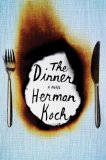Summary | Excerpt | Reading Guide | Reviews | Beyond the book | Read-Alikes | Genres & Themes | Author Bio

A Novel
by Javier MaríasEvery café has its regulars, whose conversation and habits help define the tempo and atmosphere, and who come to seem familiar, even "known" and necessary. In Javier Marías' fictional Madrid, one patron in particular stands out: María Dolz, book editor, elusive narrator, and soon-to-be keeper of an insidious secret.
The Infatuations opens with Maria's compelling memory: "The last time I saw Miguel Desvern or Deverne," she says, "was also the last time that his wife, Luisa, saw him, which seemed strange, perhaps unfair, given that she was his wife, while I, on the other hand, was a person he had never met, a woman with whom he had never exchanged so much as a single word." Indeed Miguel and Luisa were "The Perfect Couple," – the husband-wife team who used to frequent the café at the same time as Maria, and whose daily routines she relentlessly followed. It was something she used to look forward to every day. Without ever speaking to the couple, she considered aspects of their lives, forming an affection for them powered by her imagination. "You could say that I wished them all the best in the world," Maria reflects, "as if they were characters in a novel or film for whom one is rooting right from the start, knowing that something bad is going to happen to them, that at some point, things will go horribly wrong, otherwise there would be no novel or film." Indeed, things do go horribly wrong: as the reader finds out in that very opening paragraph, the husband is murdered.
Soon María meets the widow, Luisa, and the husband's best friend, Javier Díaz-Varela. The plot is further complicated both by Maria's deepening sexual involvement with Javier and by certain details about the crime that she chances upon - including that it was a murder by proxy. Eventually the novel proves far more sophisticated than this salacious premise and the author spins an impressive tale of psychological disturbances with all the shadowy enticements of a celluloid noir.
Javier Marías excels at sowing doubts about his protagonist through offhand observations – including a few that point out how difficult it is to recognize lying. This paves a circuitous trail that invites readers to question every turn the story takes. While it took me some time to settle into the ruminative style for which the author is known (see 'Beyond the Book'), I knew I'd sign on for the journey when María thinks, "…it's very risky imagining yourself into someone else's mind, it's sometimes hard to leave." María's dark speculations run deep and seem tinged with more than passing curiosity. The more I read, the more I wondered if María was merely a bystander swept in the aftermath of a crime, or something more.
The Infatuations is not a conventional story. Little happens in terms of physical movement; Madrid could be substituted by almost any cosmopolitan European city, and only a handful of facts about the characters emerge. But there's a good reason for such spareness. The author boldly shrugs off conventional expectations such as detailed descriptions – focusing instead on the deft unfolding of monologues and fluent, capacious dialog that spans multiple pages. As I gradually realized that I was, in fact, witnessing an elaborate conversation about macabre ideas—chief among them, the possibility that murder can be rationalized to absolve its perpetrators—the novel's leisurely pacing grew on me. Never mind the peripheral details, the author seems to suggest. Pay attention to the voices.
That may well be the real brilliance of the work: it turns out that the novel isn't about the "Perfect Couple" after all (they're essentially a pretext), and it isn't about lives destroyed by the crime. It is about adults ensnared in an attempt to brush truth aside—a broad concept, perhaps, but so well-executed that I quickly forgot my initial reluctance to delve into the story. What matters most is how the unusually erudite instigator of the murder details his plan as though it were an unavoidable—and even a merciful—act. María and the murder's instigator calmly expound on varied subjects, from loyalties to memory, and a novella by Balzac to The Three Musketeers. Passages that at first seem tangential eventually link together, leaving a chilling impression: these are intelligent characters whose moral ground is eroding, and whose ideas seduce by appearing to be logical, even as those same ideas remain essentially repugnant. And yet, for a brief spell, they almost seem, if not forgivable, at least understandable in their determination to convince themselves that murder is only another neutral, everyday occurrence and not a cause for great concern.
Seeking justice becomes irrelevant to María, and this, too, appears natural in the course of the novel's events. Some readers may find the absence of real repercussions worrying. I found María's reluctance to publicly unmask the murder's instigator all the more provocative for depicting a believable passivity. It stems in part from Maria's relationship with him and her ambivalence over Luisa's newfound contentment. Rather than a dramatic denouement, the ending is more in keeping with the tone of story. It is a talented author who can pen a novel about getting away with a crime, and who can build a case for keeping quiet about it, simply by having his characters talk their way through the plot. There is no need for escape scenes, drawn-out courtroom battles, or flashy devices.
Translated by Margaret Jull Costa, who received the 1997 International IMPAC Dublin Literary Award together with Javier Marías for the English version of his novel A Heart So White, The Infatuations is a confident account of rationalization and resilience after violence. For María, who wrestles over "what really happened and what is pure invention," the tongue becomes a beguiling and treacherous serpent.
![]() This review was originally published in The BookBrowse Review in September 2013, and has been updated for the
May 2014 edition.
Click here to go to this issue.
This review was originally published in The BookBrowse Review in September 2013, and has been updated for the
May 2014 edition.
Click here to go to this issue.

If you liked The Infatuations, try these:

by Hanya Yanagihara
Published 2014
Readers of exciting, challenging and visionary literary fiction will be drawn to this astonishingly gripping and accomplished anthropological adventure story that combines the visceral allure of a thriller with a profound and tragic vision of what happens when cultures collide.

by Herman Koch
Published 2013
An internationally bestselling phenomenon: the darkly suspenseful, highly controversial tale of two families struggling to make the hardest decision of their lives - all over the course of one meal.
Your guide toexceptional books
BookBrowse seeks out and recommends the best in contemporary fiction and nonfiction—books that not only engage and entertain but also deepen our understanding of ourselves and the world around us.